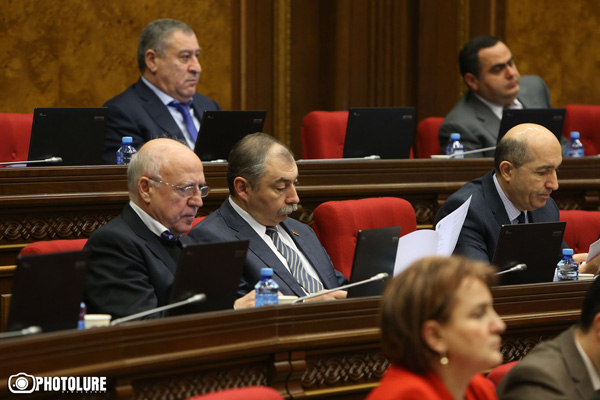The Parliament currently discusses the EU-Armenia “Comprehensive and Enhanced Partnership Agreement” signed on 24 Noyember, 2017. The agreement was discussed and received positively during the joint session of Standing Committee on Foreign Relations and Standing Committee on European Integration.
The Republican Party MP Hayk Babukhanyan addressed Karen Nazaryan, Deputy Minister of Foreign Affairs, a number of questions concerning the agreement. First he wondered whether the document that they had was an official translation or not? Then he asked: “If the new nuclear power plant is constructed, let us say by Russia, will it not contradict to the obligations undertaken with this agreement? The customs service issues of import and export, do not they contradict the obligations undertaken within the frameworks of the Eurasian Economic Union? The new obligations that we are going to undertake, do not they anyhow affect our national values? Then, the details expressed in the Attachment, for example how many seats are there going to be in a bus, what was the point of going so much into details with the Attachment?”
Karen Nazaryan assured that no provision contradicts to other obligations undertaken by Armenia concerning within integration processes.
Regarding the detailed description, Mr. Nazaryan said that this was a mutual request and approach of the specialists so that they are able to give detailed descriptions in some spheres thus allowing to improve them.
As for the possible effect the aggreement might have on our traditional values, Nazaryan said: “With this regard, the agreement contains no threats, moreover, our counterparts from the EU duly respect the values that our nation cherishes”.
To the question whether the construction of a new reactor by the Russian Federation with its own means, its own expenses, its own reactor and its own technologies will cause any problems or incompliance to the agreement, Nazaryan responded that there is no problem of incompliance.
As for the translation, Nazaryan said that when the text was published after being preliminarily signed, they wanted to inform the society: there existed 2-3 translation versions, the one that was published earlier and the other two that were eventually edited. The MPs were handed the final edited versions.



















































